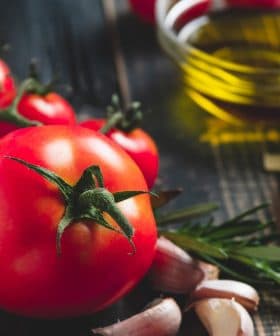London's New Ad Ban on Public Transport Equates Olive Oil to Junk Food
Olive oil producers who wish to advertise their products within London's transportation network would first need to seek an exemption to new rules banning products that lead to obesity.
 London Underground
London UndergroundThe city of London has banned advertisements for high fat, sugar, and salt (HFSS) foods and drinks on its public transport system in an effort to combat childhood obesity, following research showing high rates of overweight children in the city. The ban includes common cooking ingredients like olive oil, and critics warn it may harm Transport for London’s finances.
In an effort to tackle childhood obesity, the city of London has decided to ban food and drinks that are high in fat, sugar, or salt (HFSS) from appearing in advertisements on its public transport system.
The ad ban, which went into effect on February 25, was Mayor Sadiq Khan’s response to the research of Public Health England, which showed that more than 37 percent of 10 and 11-year-old children in London are overweight.
Olive oil is not banned outright, but we have restrictions in place for products that are HFSS. Products such as olive oil are defined by the nutrient profiling model as HFSS products.
“Child obesity is putting the lives of young Londoners at risk and placing huge pressure on our already strained health service,” Khan said. “It is absolutely imperative that we take tough action against this ticking time bomb now, and reducing exposure to junk food advertising has a role to play in this.”
The move is endorsed by many, including celebrity chef Jamie Oliver and various action groups, such as the Obesity Health Alliance, a coalition of more than 40 organizations aiming to reduce obesity levels.
See Also:Olive Oil Health NewsThe ban prevents foods such as burgers, French fries, hotdogs and many other unhealthy snacks and cooking ingredients from appearing in ads in the Transport for London (TfL) network based on a nutrient profiling model score, which is managed by Public Health England.
The profiling model produces a score for each food according to the nutrients it contains per 100 grams (3.5 ounces) and determines whether it is an HFSS product or not.
This means that common cooking ingredients, such as soy sauce, butter, eggs and even olive oil, will face the advertisement ban.
There is also a list released by TfL of foods that are of particular concern for obesity prevention due to their calorie load, including bread filled with olives.
Critics argue that the majority of TfL passengers are adults and warned that the restriction will cause serious damage to TfL’s finances due to the imposed barriers on products eligible for advertising.
Andrew Boff, a member of the London Assembly who was authorized to scrutinize the mayor’s activities, spoke of a “reckless” move at a time in which TfL faces a big deficit. He added that not only junk food will be impacted by the ban.
“It is not just junk food adverts which will be banned; Londoners will not be allowed to see adverts for everyday items, such as olive oil, stock cubes, and pesto,” he said.
With the new system, the onus is on the advertiser to demonstrate, in case of a doubt, that a product is non-HFSS compliant, should they want to display it in posters and billboards in the underground and elsewhere.
A spokesperson from TfL told Olive Oil Times that the profiling model they use recognizes the benefits of a balanced diet, including protein, fiber, fruit, vegetables and nuts.
“It also identifies food with ingredients which children should reduce in their diet, such as saturated fat, salt and sugar,” the spokesperson said. “If a product is deemed to be an HFSS product, then it cannot be used in advertising in TfL’s network unless it has been granted an exception.”
As far as olive oil is concerned, the spokesperson specified that it falls into the HFSS food category and therefore is not currently allowed to be shown in advertisements.
“Olive oil is not banned outright, but we have restrictions in place for products that are HFSS,” the spokesperson said. “Products such as olive oil are defined by the nutrient profiling model as HFSS products.”
However, the spokesperson clarified that an exemption from the ad ban for olive oil is almost certain with the proper justification.
“If brands that have these products [olive oil] want to advertise them on the TfL estate, we would be happy to receive an application for an exception based on the product not being consumed by children or promoting an HFSS diet,” the spokesperson said. “With clear information, we would fully expect them to get an exception.”
The spokesperson also confirmed that TfL has not yet received any exception applications for olive oil.









